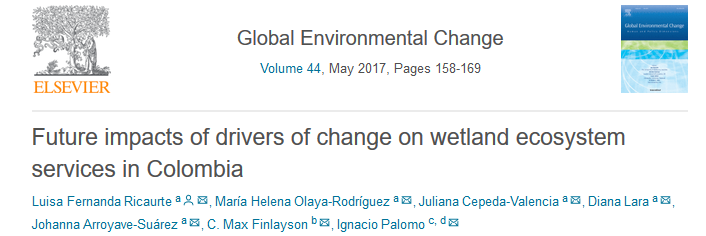BC3 Journal Article “Future impacts of drivers of change on wetland ecosystem services in Colombia”


Go to external source
Ricaurte,L. F., Olaya-Rodríguez, M., Cepeda-Valencia, J., Lara, D., Arroyave-Suárez, J., Max Finlayson, C., Palomo, I.Future impacts of drivers of change on wetland ecosystem services in Colombia. Global Environmental Change. 44. 158-169. DOI (10.1016/j.gloenvcha.2017.04.001).
Abstract
Wetlands are among the most valuable ecosystems in the world due to their delivery of ecosystem services (ES), but they are particularly vulnerable to drivers of land-use change. However, little is known about how different wetlands respond to drivers of land-use change and how that impacts their delivery of ES. After extreme floods hit Colombia in 2010–2011, negative impacts from these storms heightened the interest of Colombian policy-makers in understanding and recognizing the importance of wetlands. Here, we present a map with 19 wetland types for Colombia and assess the ES that these wetlands deliver and how those ES are impacted by drivers of land-use change. We based our spatial analysis on the Corine Land Cover data for Colombia and combined that with spatial indices derived from knowledgeable experts using the matrix approach and participatory mapping (PGIS). The most vulnerable wetland types identified were floodplain forests, riparian wetlands, freshwater lakes and rivers. The region of Magdalena-Cauca has been identified as the most vulnerable to the impacts of land-use change, until 2025. We discuss our results in light of the current Colombian policy-debate which concerns the designation of wetlands as strategic ecosystems. This designation implies necessary restrictions or prohibition of harmful activities in wetlands, principally mining and industrial agriculture.
